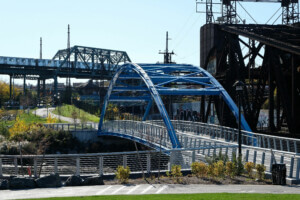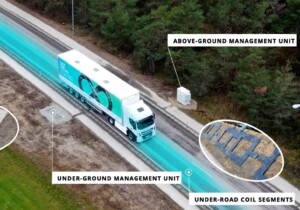Despite the flashy promises of supersonic rail travel through vacuum-sealed tubes and six years of work by Bjarke Ingels to envision rapid intercity transportation systems, Richard Branson’s Virgin Hyperloop is reportedly struggling. The company has reportedly laid off 111 employees, about half of its staff, and will drop the passenger side of the business to focus exclusively on transporting freight.
The basic idea of all Hyperloop systems (there are a variety of competitors) all stem from an Elon Musk-authored white paper from 2013, where the Boring Company and Tesla founder speculated on the potential of putting train systems levitating on magnetic tracks in airless tubes. There, without wind resistance, it would be possible for pods to accelerate to over 700 miles per hour, laying the basis for ultra-high-speed rail capable of transporting both cargo and people long distances for less money and with less of an environmental impact than flying.
Of course, as Vice pointed out, Musk himself never chose to pursue building a Hyperloop, and in the eight years since, no company has successfully deployed a commercial version. It took until 2020 for the first successful human test run, when Virgin Hyperloop accelerated two passengers to 100 miles per hour across a 1,640-foot-long stretch of test track. (Taking place at the company’s DevLoop test track outside of Las Vegas, the passenger rode in a BIG-designed Pegasus pod, a scaled-down version of the cars that Virgin Hyperloop had hoped would carry up to 23 passengers at a time.)
The company was also able to enlist a bevy of big design names to further its ambitions; in 2018, Virgin Hyperloop revealed an autonomous cargo transportation network designed by Foster + Partners that could one day ship across Dubai to Asia and Europe. In 2020, West Virginia was selected as the future home of the BIG-designed Hyperloop Certification Center (HCC), a $500 million, 800-acre research campus complete with a six-mile-long test track that would have set the company up to launch its first commercial Hyperloop in 2030.
At the time, the company was promising routes that would move people and cargo from Pittsburgh to Chicago in 40 minutes and New York to Washington, D.C. in only half an hour. Additional routes had been proposed that would sprawl across the country, linking Dallas, Fort Worth, Austin, San Antonio, and Laredo along one line, for instance.
A spokesperson for Virgin Hyperloop told The Financial Times that the pivot was largely related to supply chain issues and a reordering caused by the COVID-19 pandemic. The regulatory and safety hurdles for shipping people over cargo are also much higher, and by cutting that element, the system has a higher chance of actually being realized. On the bright side, DP World, the logistics company owned by the United Arab Emirates that retains a 76 percent stake in the company, told FT that “15” customers were in discussions to lay Hyperloop routes to transport goods.
Still outstanding is the question of what will happen to the HCC. Today, West Virginia Governor Jim Justice publicly questioned what would become of the campus, noting that he hadn’t as of yet heard one way or the other what the company’s plans are. West Virginia beat out 16 other states to host the HCC, and Justice acknowledged that the company had already invested quite a bit of money in the project, but could just as likely walk away given the shift in business model.











